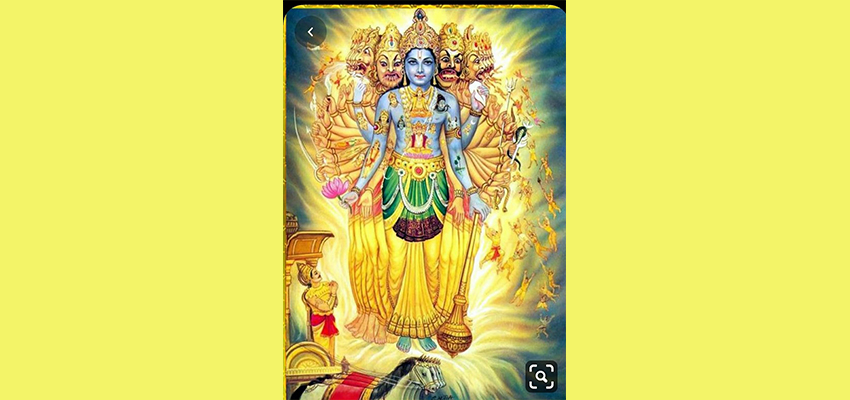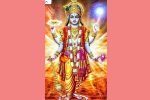NAME 12
Muktānāṁparamāgatiḥ मुक्तानांपरमागतिः
Mukta means all those who are liberated. Mukta-s can find a way out of bondage, through Viṣṇu. Viṣṇu is the ultimate goal of all the liberated men. Men have attained liberation by pursuing the right kind of knowledge; otherwise, they could not have been liberated. Among other factors, knowledge and mind, the former leading to the latter, play a pivotal role to attain spiritual liberation. Mukta-s are those who have attained the right kind of knowledge and through which, controlled their minds and attained emancipation. This nāma says that mukta-s have attained liberation by being devout to Him.
During the transitional stage from dvaita to advaita, one is still associated with names of Gods and Goddesses. Only in the highest stage of advaita, names and forms of Gods and Goddesses get dissolved into the Self illuminating Brahman. Spiritual pursuit should be gradual and steady and the transition has to happen on its own.
Muktas, who surrender to the lotus feet of Viṣṇu are not born again. Kṛṣṇa says, “Great souls, who have attained the highest perfection, having come to Me, are no more subjected to rebirth” (Bhagavad Gita VIII.15).
१२. || ॐ मुक्तानांपरमागतये नमः||
12. Om Muktaanaamparamaagatihye namah
Muktaanaamparamaagatih -He who is the final Goal (“paramagathi”), that is reached by all the liberated souls (“mukta”). The limitations and bondages lived through by man are in fact the destiny of the matter vestures. Through delusion of non-understanding, we identify with them and come to suffer the consequent sense of imperfections. To liberate ourselves from the thraldom of matter is to realize the Self. Hence the Truth is defined as the Supreme Goal of the emancipated.
This ‘Goal’ to be attained is called as ‘Gati’ in Sanskrit, “The Supreme Goal” (ParamaaGatih) would necessarily be then that Goal, having reached which, there is no return:
“There where having gone, men never return, That sacred place is My seat”-Geeta Ch. 15. St. 6. In Geeta. (Ch. 8. St. 6)
even more explicitly the same idea has been asserted by Sri Krishna when He says:
“O Son of Kunti, having reached Me, there shall be no more any re-birth”.
Again, He defines the final Goal as “That having reached no return again” – Geeta Ch. 15, st.4.
muktanamparamagatih / One who is the ultimate goal for all muktas or Released or Liberated Souls.
INTERPRETATION GUIDED BY SANT VANI (WORDS OF SAINTS)
Muktānāmparamāgatiḥ
The ultimate goal of those who are liberated.
Muktānāmparamāgatiḥ–it is the ultimate and the highest goal for all those who are enlightened, liberated. Gaining that goal, there is no further end to be accomplished. Since there is no losing it or getting away from the Atma that is paramā – Paramātmā , that alone is the paramāgati.
All other goals in life – family connectedness, big property, successful children, and finances to sustain retirement are works in progress. When can I say, enough? Rarely ever.The family situation can always be improved upon some more, children could do, with being more successful, etc. When we look at our goals there are 3 things that are common in all of them.
No one wants to be bound by time, that is, nobody wants to be a mortal. Everyone wants to live.
Even those, who are about to die, want to live a day more. ‘I want to live’ is a want that is natural to everyone. We want ourselves to live forever and the same applies to loved ones too.
We also want conducive situations in our life to continue forever. Everyone wants to be happy. No one wants to be unhappy. People want to commit suicide, not because they do not want to live, but because they see no way of living happily. They think that committing suicide will give them a release from their sorrow. Therefore, the desire to live becomes now ‘I want to live and live happily.’
Again, nobody wants to be ignorant. ‘Nothing should happen around me, that I do not now. I cannot see myself ignorant’ is the feeling of everybody. Even though we may not believe in the daily horoscope forecast, it is difficult to resist a quick peek at the daily newspaper to know about how my day is going to pan out.
Thus, no one wants to be time-bound. No one wants to be unhappy, inadequate, small and imperfect. In other words, no one wants to be a wanting person. Nobody can accept oneself as being ignorant. Freedom from mortality, ignorance and inadequacy is what everyone wants. In fact, what one wants to be, is what one already is.
Mūkti, the goal to be achieved is your nature knowing which there is nothing more to be known.
You want to be free from being subject to time. But, you are the very basis of time, the truth of time. The ‘I’ is the consciousness, which is limitless in terms of time and space. It is the whole; it is ānanda. It is both the subject and the object. When the subject is not a person wanting something, at that time, it is wholeness that is experienced.
When someone listens to music and is satisfied, then, the person in him who wants something, does not rise. It is resolved for the time being. The subject and the object, the listener and the music, are fused into one.
You are ānanda, and that is the whole. You are free from time, free from inadequacy, unhappiness and that is your true nature. You are the consciousness, because of which you know what you do not know and you know what you know. You are that consciousness, which sustains both ignorance and knowledge. You are free from being ignorant, free from being bound by time, free from being a wanting person. You are the whole and hence you are the Lord, who is paramāgati.
The Lord is the paramāgati and in this way alone, one understands the Lord.
The ultimate destination of all ‘liberated’ Ātmās. Those who have broken the birth-rebirth cycle of Samsāra reach him, sublimating their ‘selves’ within and are never born again.
Most translations use the word “Goal” which is not the appropriate word to use here. It should be noted that the operative word is MUKTĀNĀM, i.e. those who have been liberated and not ‘seekers’ who are seeking to reach that “ultimate” goal.
Those who have been liberated, for them the final destination is that supreme being who is forever free.
In the Bhagawad Gita (Chapter 8, verse-16), Krishna gives this very same assurance to Arjuna
आब्रह्मभुवनाल्लोका: पुनरावर्तिनोऽर्जुन | मामुपेत्य तु कौन्तेय पुनर्जन्म न विद्यते || 16||
ā-brahma-bhuvanāl lokāḥ punar āvartino ’rjuna mām upetya tu kaunteya punar janma na vidyate
Arjuna, In all the worlds, even Brahmaloka, all beings (including Brahma) are subject to the cycle of birth and death. Those who reach me though, are freed from the cycle of birth and death – never to be born again and sublimated within me and forever free…
As Parāsara Battar notes, it is those who are able to get away from the seventeen qualities – 5 elements, 5 Jnanendriyas, 5 karmendriyas along with the Manas (Mind) and Kāla (Time) – “they attain utmost equality with the Supreme Puruṣa” – this equality is of course ‘qualified’ in keeping with the Viśiṣṭādvaita (विशिष्टाद्वैत) viewpoint i.e. the JivaĀtmā is ‘like’ the ParamĀtmā in all aspects except when it comes to the activities of “Creation” and Destruction (see BHŪTAKṚD:).
The sublimation or the dissolving of the JivaĀtmā into the ParamĀtmā such that all differences are completely erased, like the waters of the many rivers draining into the ocean with neither a rise or fall in the level of the ocean which is the Ādvaita (अद्वैत) viewpoint is not something that Viśiṣṭādvaita (विशिष्टाद्वैत) accepts – this is also the reason that in the English language, Viśiṣṭādvaita (विशिष्टाद्वैत) is often referred to as “Qualified-Ādvaita (अद्वैत)”
The ultimate destination of all ‘liberated’ Ātmās. Those who have broken the birth-rebirth cycle of Samsāra reach him, sublimating their ‘selves’ within and are never born again.



